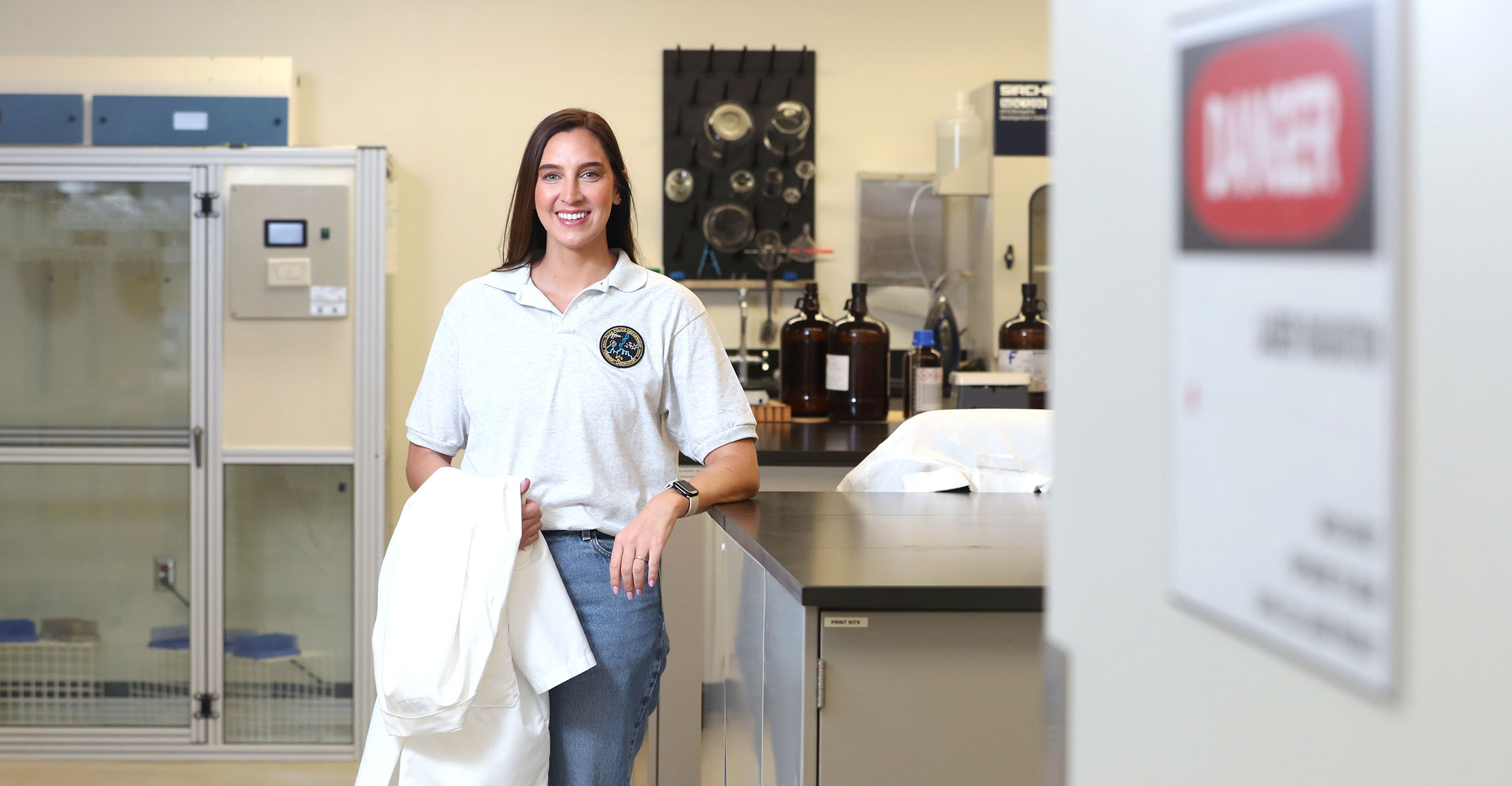
From front desk to forensics: Tulsa’s Katie Casper finds her calling
Thursday, May 8, 2025
Media Contact: Neile Jones | Communications Manager | 918-561-1169 | neile.jones@okstate.edu
What began as an administrative assistant position turned into a life-changing career for Katie Casper, a woman who not only found her calling in forensic science but also became the first in her family to go to college.
“I didn’t know how to apply to college. I didn’t know how to research schools,” said Casper, who earned track, volleyball and academic scholarships to attend Southwest Baptist University in Missouri. “I just knew I wanted to go.”
Casper majored in psychology and sociology, then pursued a master’s in psychology. But a single elective course in forensic science opened her eyes to a new world.
“Every class, the more I was learning, I was falling in love with it,” she said. “Utilizing skills to objectively help your community — that was so cool to me.”
She switched graduate programs and earned a master’s degree in forensic science from the University of Central Oklahoma in 2015. Despite her qualifications, Casper said she was often told she was overqualified when applying for jobs.
“I applied for jobs everywhere,” she said. “I just wanted to get in the door somewhere.”
That door opened when she was hired as a front desk administrative assistant at the Tulsa Police Department forensic laboratory. Less than two months later, a position opened up in the latent print unit — the division that handles fingerprint and palm print analysis. Casper was offered the role, trained from the ground up and sent to Camp Shelby Military Base in Mississippi for a rigorous 20-week academy.
When she returned to Tulsa, she progressed through the ranks: from scientist to senior scientist, then supervisor and now forensic technical manager of the latent print unit.
“I love my job,” Casper said. “I don’t plan on ever leaving because I love it.”
Her responsibilities include processing fingerprint evidence from crime scenes, running prints through databases, testifying in court, training new examiners and sometimes helping identify victims at scenes.
Casper is also passionate about solving cold cases — often decades old — using the FBI’s Next Generation Identification, or NGI, system.
“I love cold cases so much,” she said. “It’s satisfying knowing the victim wasn’t forgotten — that we’re still pulling their evidence 30 years later and working it with the most advanced technology.”
When the lab gained access to NGI, it allowed analysts to revisit unsolved cases with new tools and national reach. Casper works closely with detectives to identify, reprocess and re-examine old evidence — sometimes discovering prints that weren’t previously searchable.
Her academic path didn’t stop at her master’s. Casper went on to earn a doctorate in forensic sciences from OSU Center for Health Sciences — and she didn’t have to go far.
The forensic laboratory for Tulsa Police is located on the CHS campus. “We’re on the second floor, with the (Tulsa Police Department) property room (and evidence unit) below and the graduate forensic sciences programs above.”
That proximity created a unique opportunity.
“I thought, this has got to be the most amazing setup that any graduate student could dream of,” she said. “I get to continue working. The police department was very supportive of us being in the graduate programs. They offer scholarships for us.”
“We have so many graduate programs that are completely doable for the working adult
at OSU-CHS. I never backed out of hours at Tulsa Police. I took two classes every
semester and that helped me balance work and life and school.”
She said the police department also works closely with OSU-CHS forensics to support internships and lecture in master’s and doctoral-level classes.
She completed her Ph.D. during the pandemic while working full time.
“We have so many graduate programs that are completely doable for the working adult at OSU-CHS,” she said. “I never backed out of hours at Tulsa Police. I took two classes every semester and that helped me balance work and life and school.”
She now teaches a full-semester course at OSU-CHS titled, Fingerprints and Their Role in Forensic Science, and is developing a second class focused entirely on advanced comparison techniques.
Casper also encourages people to look beyond the medical school when considering OSU-CHS.
“Most people don’t realize that there’s more than just the DO program (Doctor of Osteopathic Medicine) at CHS,” she said. “That’s what I realized. We have so many other programs that are so valuable. And the faculty and staff I’ve worked with have always been great.”
The friendships she’s made have also stood the test of time.
“Some of my best friends I have in my life now — it's funny — we crossed paths at OSU-CHS for years while they were getting their DO,” she said. And they eventually connected outside of campus. “Even though I wasn’t in that program, those friendships have become some of the most meaningful in my life.”
And if you’ve ever watched the true-crime show “The First 48,” you may have seen her. Casper has appeared on multiple episodes while assisting on major investigations, as the Tulsa Police Department is regularly featured in the series.
Despite the increased visibility, academic success and leadership role, Casper says her passion remains rooted in service. She often shares this advice with others interested in following a similar path.
“If you want a job in forensics or law enforcement, just try to get in somewhere,” she said. “I started at the front desk. Just get experience.”
She wants the community to know her focus is on the people connected to the cases in which she works.
“At the end of the day, I want the people we’re serving to know they are not forgotten,” she said. “That matters.”
